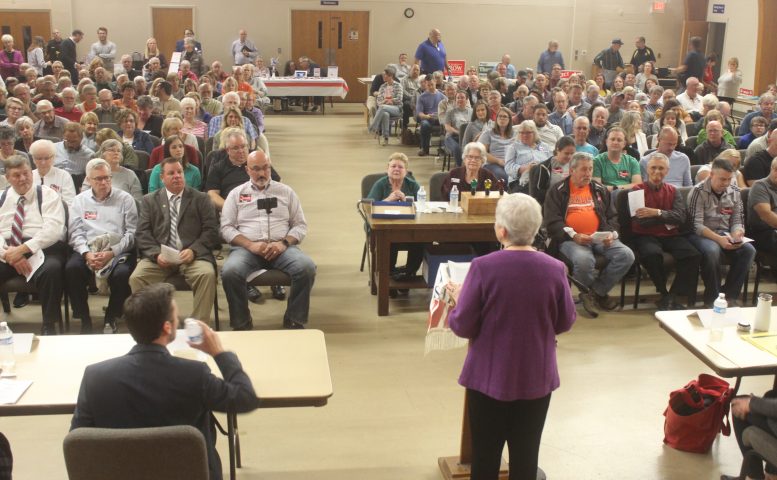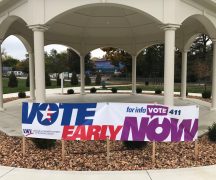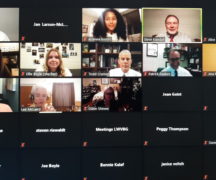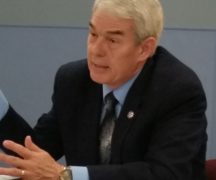By JAN LARSON McLAUGHLIN
BG Independent News
Lee Hakel remembers the moment that inspired her to join the League of Women Voters 50 years ago.
During a state prison riot, inmates had taken guards hostage and were holding them in a cell. The governor ordered the cell to be blown up – with seemingly no regard for the guards or the inmates.
“My interest in good government was piqued,” Hakel recalled. “I’m a fanatical believer in democracy.”
Hakel found a place for her beliefs with the League of Women Voters, first in Columbus and now in Bowling Green. She has been joined by countless other women and men across the nation.
As the Bowling Green’s LWV embarks on its 70th year, its focus remains on educating its membership – then sharing that education with the community.
“We stand on the shoulders of many strong intelligent women who have done the work of LWV over the past 70 years,” member Ellen Dalton said.

The group, with its 90 or so members, is committed to registering voters and then giving them the non-partisan information they need to cast their ballots. The league hosts voter forums, publishes voter guides, and prints lists of public officials.
“I think these are the bedrock of what we do,” Dalton said. “I feel this is such an important service for the community.”
The crowds that attend the candidate forums increase annually. Last year, because of COVID, the forum was televised – with more than 1,500 people viewing it.
“This is a good even-handed organization, where you can find reliable information,” said Lee McLaird, who is a third generation league member.
“I really think the league does a good job of trying to educate the population,” member Anne Bullerjahn said.
The issues tackled by the league are wide ranging – and intensely studied prior to the organization taking a stance.
The topics studied by the league vary from public school funding, guns in schools and land use, to health care equity, mental health and the needs of elderly.
“We really try to be involved in current issues,” said member Joan Callecod.
“We have no shortage of issues to talk about,” said current LWV President Janet Parks.
The women – and men – are dedicated to thorough study of an issue before the organization takes an official stand on the topic. That means when the League of Women Voters arrive at a stance – its words can be trusted to be well researched.
“It’s a very thoughtful organization. They don’t take any position without studying it first,” Callecod said.
“When the league speaks, people rely on it. It’s done after careful study,” Dalton said.
“We have such strong and smart members, they do their homework,” Parks said.
If there is no clear consensus on an issue, the league does not take a stand, member Joyce Kepke said. After the issue is studied, if the membership is torn, the organization does not take the issue any further.
“You have to have consensus before taking a position,” Kepke said. And the consensus must be strong. “It’s a very educational process to get to that point.”
The latest topic selected for study by the Bowling Green LWV is the criminal justice system.
Though statewide the league has been criticized as leaning liberal, the local members assure that their league work is non-partisan.
Hakel, past president, said the league has long risen above partisanship.
“We’ve had 101 years of experience,” she said. The league was formed the same year that women gained the right to vote a century ago in the U.S.

“People get upset with us,” for what they see as partisan positions, Bullerjahn said. “But I really do see our job as education and advocacy for issues that should be non-partisan.”
Members admit it is difficult to walk that line – dealing with political issues without being partisan.
But they stand by their commitment to not take sides politically. The league never endorses candidates or parties on the ballot. They just make sure voters have access to information about all the candidates and issues before they vote.
“It can be a challenge from time to time,” McLaird said. But the league wants the voting public to be aware of candidates’ viewpoints and the potential impact of issues on their ballots.
“We have a reputation of being non-partisan,” Callecod said. But the strong divide in the nation and locally may make the league’s stances appear partisan to those who take extreme views on issues.
“We’re so polarized right now” as a nation, Callecod said.
For example, the league supports public education and opposes arming personnel in schools. Some may see that as liberal – while the league sees it as rational.
“I believe so strongly in civil rights, the right to vote and non-discrimination,” Parks said. “We may give the appearance of being partisan – but we try very hard to not take political sides.”

The local members have worked hard to support redistricting in Ohio – and on educating voters on why the drawing of congressional lines is so important. Again, they don’t see that stance as liberal, but necessary to allow Ohio voters to choose their elected officials, rather than the elected officials choosing their voters.
“The league worked hard on that,” Dalton said.
The push for redistricting was successful and supported by voters – but is once again being threatened to be overturned by politicians.
So the league is fighting that battle all over again.
Bullerjahn said people have asked her why the yard signs about redistricting are reappearing. “Didn’t we already decide that?” they ask. “We voted twice to have fair districts,” she said.
More than 70% of the electorate supported the redrawing of district lines.
“They don’t want gerrymandering,” said Callecod, chair of the voters rights committee.
The league has long pushed for voting rights – acknowledging that the first step is always registering voters.
“You can’t do anything till you get registered,” Kepke said.
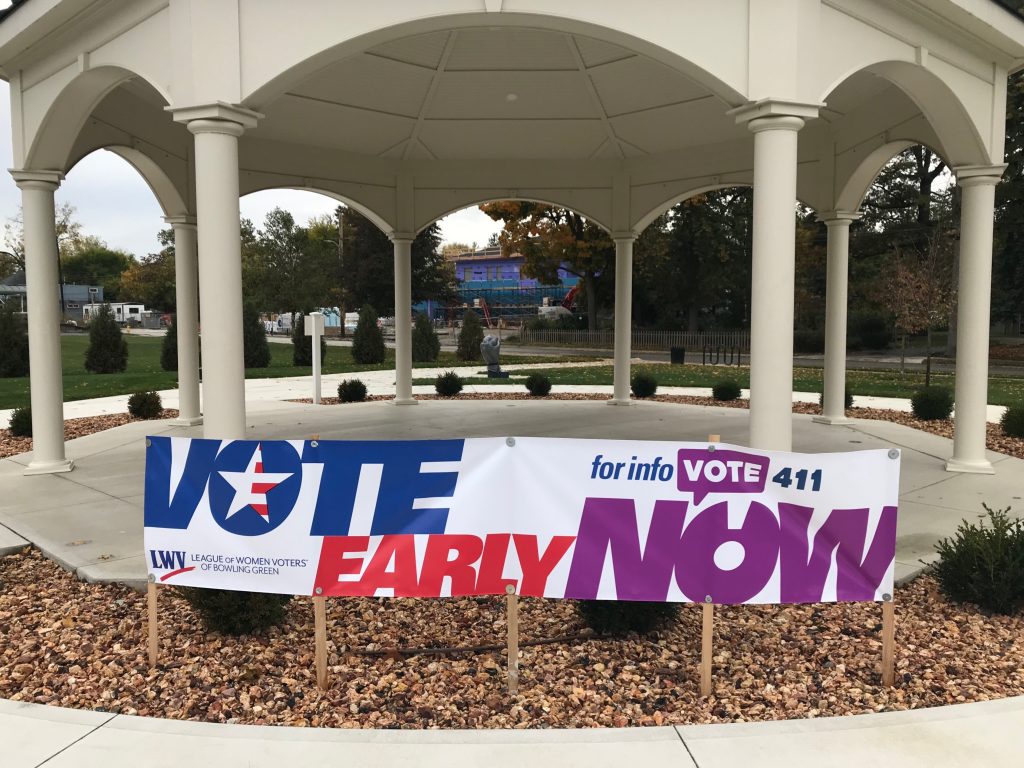
So league members are often seen staffing tables in all types of settings and weather – just to make sure people are registered to vote.
Last year during the COVID-19 pandemic, the league focused on making sure local voters were aware of all the different ways they could cast their ballots.
“I think we did a good job getting people to vote early,” Bullerjahn said.
To make sure their membership is well educated themselves, the league often sends representatives to sit in on local board of education and city council meetings. And knowing that the average citizen may be reluctant or intimidated by the thought of contacting their elected officials, the league makes sure people know how to reach those who represent them in Bowling Green, Columbus and Washington, D.C.
“The league has gotten better and better at making advocacy easy,” Bullerjahn said.
The organization holds public forums, writes letters to the editor, plants yard signs and even marches in parades to get information out.
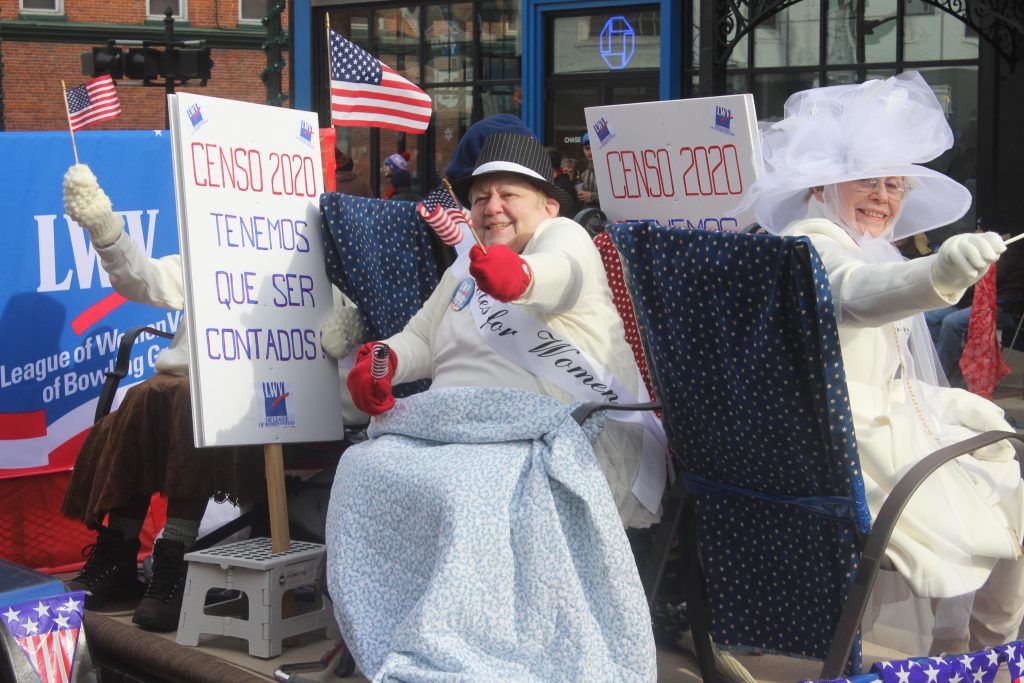
“We want to make sure these issues stay in front of the public,” Callecod said.
In these times of information overload from sources of varying reliability, the League of Women Voters sees its role of providing trustworthy data as even more vital, McLaird said.
But like many organizations, finding young members to carry on the work is difficult.
When Kepke joined the league 50 years ago, the makeup of the group was different.
“When I first became a member, I was young, with young children,” and the group offered child care, she said. Now, the group has grayed, and it’s difficult to find young people who can juggle jobs, their children’s commitments, and civic engagement.
“We struggle with that. We’d like younger members,” Kepke said.
Though the name implies the group is just for women, men have long been accepted as members and in leadership roles.
“We are very open and inclusive,” Hakel said.
Milt Hakel, Lee’s husband, is one of the male members of the local organization. He still sees a strong role for the league.
“People’s interest in preserving democracy seems to be growing,” he said.
The members are not only focused on educating the public – but also themselves by spending time with open minded people.
“It certainly has made me more knowledgeable about political issues,” Kepke said.
Opposing viewpoints on topics are welcome, according to Parks.
“Our discussions involve very civil discourse,” Parks said. “We disagree about some things, but we’re very respectful of our differences.”

